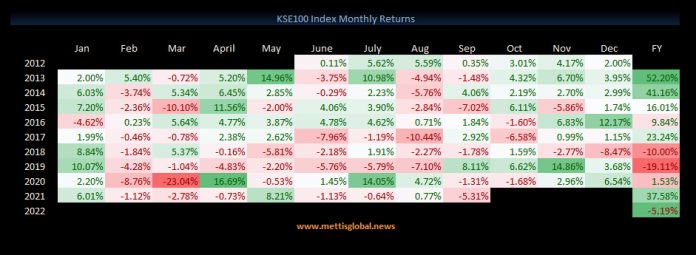October 2, 2021 (MLN): After giving a 7-year high performance of 38% return in FY21, the benchmark KSE100 has ended up being one of the worst-performing markets during 3QCY21. The index declined by 2,456 points or 5.19% in Rupee terms and 12% in USD terms in the quarter, breaking the positive streak of the last 5 quarters.
Similarly, the month of September’21 also turned out to be the worst month for the stock market after March’20, as the KSE-100 index plunged by a whopping 2,520.14 or 5.3% MoM to close at 44,900 points.
The average quarterly gains were 10% in Rupee terms and 12% in USD terms.
According to Topline Securities, even when compared to other countries, Pakistan remained one of the worst-performing during 3Q2021. Brazil and Hong Kong were the only other markets that performed worse than Pakistan as they down by 19% and 15% respectively. Moreover, Srilanka and India were up 21% and 13% respectively.
Despite Super Corporate Results, Why There Was A Severe Bloodbath In The Market?
Initially, the reclassification dilemma where the MSCI has reviewed to downgrade Pakistan to Frontier Markets instigated investors losing their confidence in the KSE100 share index and accelerated foreign selling. Foreign corporates alone sold a net $50mn worth of securities during Sep’21, much higher than the monthly average outflow of $22mn across 8MCY21. This has faded away the positivity of the ADB report that Pakistan may grow by 4% in FY22 along with the progress on the GSP Plus to continue till FY23.
Next, continued depression in the currency market has caused a severe bloodbath in the benchmark index. A large current account deficit (last 3 months: US$1.3bn on average) led to the PKR losing 2.5% MoM against USD while rising demand and the upcycle in international commodities affected the inflation outlook. Moreover, stagnant foreign direct investment painted a gloomy picture of the economy and investors’ worries about an increase in import payments, freight cost and inflation in the coming months took a toll on the benchmark, pushing it below the 45,000 level. To contain the soaring current account deficit and higher inflation expectations, SBP increased interest rates by 25 bps to 7.25% after 15 months. At the same time, regulations for Auto & Personal financing were tightened, to curb luxury consumption.
Besides this, the benchmark index remained under the equity meltdown on the likely imposition of US-led sanctions on Afghan allies and Pro-Taliban countries. More than 20 Republicans have introduced a bill in the Democrat-controlled Senate, which seeks to impose sanctions on the Afghan Taliban and their supporters, which may include Pakistan. “We believe that while it is difficult to expect much of a thaw in US-Pakistan relations, it is even more difficult to see a complete breakdown and sanctions coming through. An unstable Afghanistan, and the risk of transnational terrorism this entails, hurts both Pakistan and the US and further destabilization is in no one’s interest,” Raza Jafri at Intermarket Securities said.
To highlight, the tabelling of the Anti-Pakistan Bill in the US Senate plunged the benchmark index by 2.4% during the last week of Sept'21, marking the 5-months low since 3rd May'21.
From a sector-specific lens, the sectors that performed poorly during 3QCY21 were Cement (-1,016 pts) given an unpreceded surge in coal to over USD 190/ton, Oil & Gas Exploration Companies (-305 pts) Refinery (-289 pts), Oil & Gas marketing Companies (-218 pts) and Food & Personal Care Products (-197) emerged as the worst-performing sectors during 3QCY21. To be specific, the scrips of LUCK (-376 pts), HBL (-197 pts), PPL (-188 pts), OGDC (-172), and DGKC (-153) turned out to be the most disappointing ones.
In the month of September, Cement, Fertilizer, Oil & Gas Exploration Companies, Auto Assembler, and Textile Composite emerged as the worst-performing sectors as they took away 1,480 points from the benchmark KSE100. In particular, the scrips of LUCK (-288), HBL (-245 pts), OGDC (-139 pts), PPL (-108 pts), and ENGRO (-107 pts) turned out to be the most disappointing ones.
With the enraging uncertainty on the economic front and frustration in the Asian region, KSE-All-Share Market Cap decreased by nearly $4.09 billion, in Sept’21 i.e. 8.22% lower than the previous month. In terms of PKR, the All-Share Market Cap nosedived by Rs485.9 billion i.e. 5.86% lower as compared to the last month. This took the 3QCY21 figure to down by 5.9% in Rupee term and 13.17% in USD terms.
Flow-wise, foreigners have continued on their selling spree, offloading $44.8mn worth of equities during Sep’21 which is more than half of the foreign selling of $83.3mn in 1QFY22. Selling was primarily seen in Banks ($41.6mn), Cement ($9.3mn), Fertilizer ($4.7mn), E&P ($4.0mn), and Power ($0.2mn). This was primarily absorbed by Individuals ($29.1mn), Banks ($16.7mn), and Insurance Companies ($16.3mn).
“While Sep’21 was a month of a lot of bleakness and negatives, we believe that the market has declined higher than warranted. Resumption of IMF program and additional controls by authorities to reduce import growth hold key to the market outlook,” a report by JS Global said.
The decision with IMF will likely simmer the possibilities of a thaw in US-Pakistan relations while also bring clarity to several measures to be taken during FY22; including energy tariff hikes and fiscal improvements. As per Bloomberg, KSE100 is currently trading at a forward PE of 5.3x, 35% discount to its 10yr means and offers a lucrative dividend yield of 6.9% for CY21E, it added.
Moreover, FATF, due to meet in the latter part of the month, wherein Pakistan may be removed from the grey list due to strong compliance performance. Further, developments in relations with the US, are likely to keep the market volatile in the near term.
Muhammad Saeed Khalid Siddiqui at Shajar Capital predicted that the index may revive sentiments ahead of the Nov'21 MSCI review where the investors may likely increase their participation amid higher weightage in MSCI FM. He expects a slowdown in imports in the midst of loan sanctions on imported vehicle financing may likely improve Current Account deficit numbers in Sept'21.
Copyright Mettis Link News
27215




